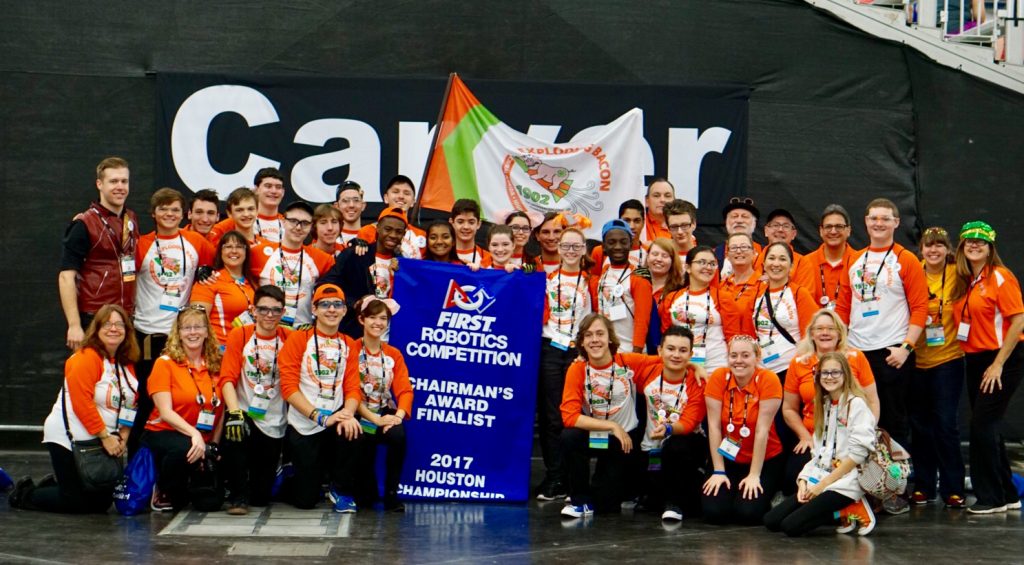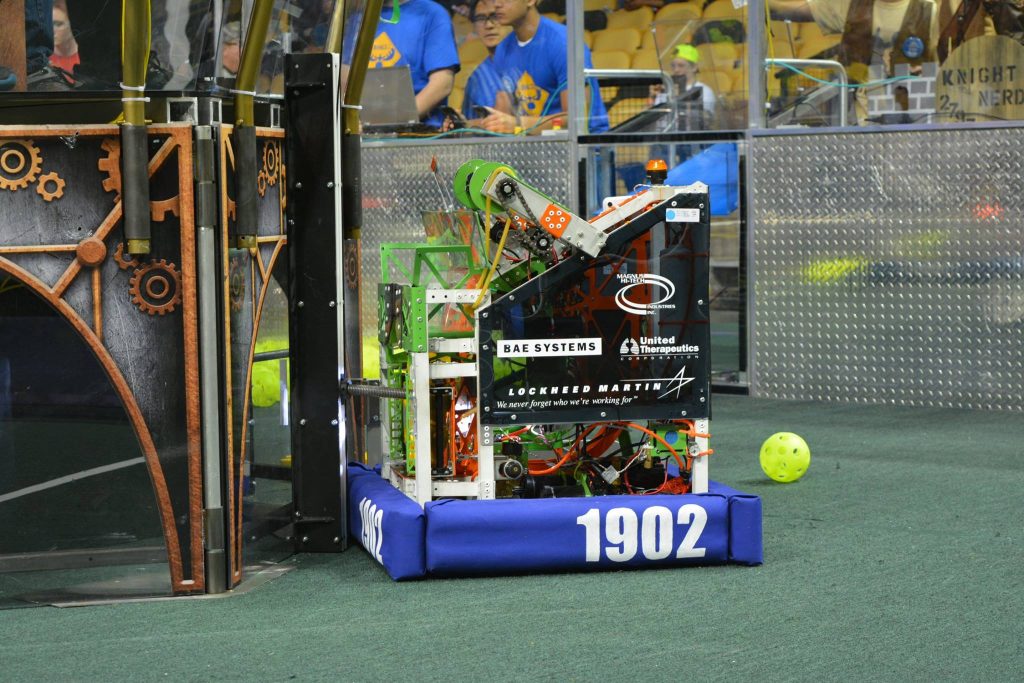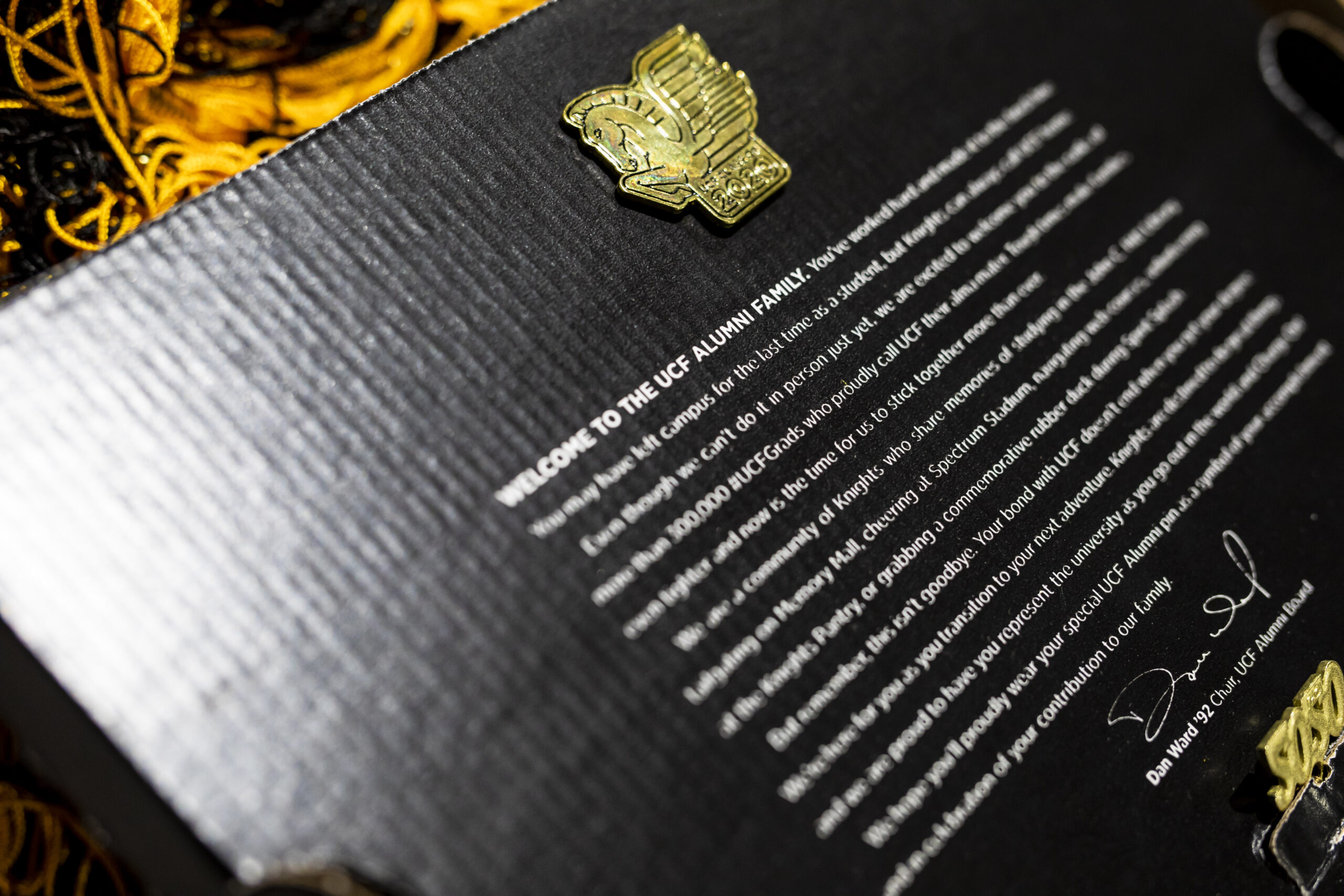Knights’ Love For Bacon And Bots
 Courtesy of Exploding Bacon
Courtesy of Exploding Bacon
By Jenna Marina
ORLANDO, Fla. (May 10, 2017) – With a name like Exploding Bacon, it’s hard to believe that the moniker was the second choice for a local youth robotics team led by alumna Elise Cronin-Hurley ’90 ’94MPA.
Organized Chaos was voted as the winner – conceptualized by a random name generator – but when the mother of the lead mentor doodled a pig riding a rocket as a potential logo, the team knew it needed to reverse its decision.
Now, 12 years since that day, Exploding Bacon is coming off its largest win in team history as a Chairman’s Award finalist at the 2017 Houston FIRST World Championships.
FIRST was founded nearly 30 years ago to inspire young people’s interest and participation in science and technology. The Chairman’s Award is FIRST’s most prestigious award and is given to the teams that best represent a model for others to emulate.
“We are very proud because it’s definitely not just this year’s Exploding Bacon team who won that award. It’s built on a lot of people’s sweat and tears and a lot of effort and just a passion and a heart for it,” Cronin-Hurley said. “We’re very close knit group. Once you’re bacon, you’re always bacon.”
Cronin-Hurley had never heard of Exploding Bacon when she drove her son, Zachary, to the team’s headquarters for the first time in 2011. Unsure of what her teenager was signing up for, she wanted to learn more about the program, so she stuck around that first practice and has been there ever since.
Zachary, now a mechanical engineering major, is one of three current UCF students who volunteer with the team and said he has incorporated lessons and textbook materials from his coursework at UCF into his role as a mentor for Exploding Bacon.
Over the years, Cronin-Hurley’s role has also changed. She worked her way from serving as a volunteer parent to the lead of the FIRST Robotics Club program.
The political science, organizational communication and public administration alumna owns a freelance graphic and web design business. She said she never envisioned working with students or becoming a teacher. Yet, the relationships she has built over the years has kept her coming back.
“You really care about their individual progression and what they’re able to accomplish, and you want to help them,” she said. “I work all day on a computer for 8-10 hours and then I come here for 2-5 hours a night. This is what feeds me. Working with them feeds me.”
Dominic Canora, who attends Lake Highland Prep, is co-president of the 30-member team this year and will attend UCF in the fall as a freshman, choosing the university over Georgia Tech.
His fellow team members hail from 12 different schools or home school. They span five different counties, and some drive one hour each way to attend a four-hour practice session weekdays during competition season.
In a six-week span, the 30-member team builds and programs an industrial-size robot to play a difficult field game against more than 15,000 students from around the world.
 Exploding Bacon’s robot, which was built in a six-week span, at the FIRST World Championships | Courtesy of Exploding Bacon
Exploding Bacon’s robot, which was built in a six-week span, at the FIRST World Championships | Courtesy of Exploding Bacon
In addition to its annual competition, Exploding Bacon established the #FIRSTLikeAGirl video campaign to share the stories of the women and girls on the team to inspire and encourage girls everywhere to pursue their interests in STEM.
Alexis Bishop is a UCF student and a mentor on the team who has eagerly helped develop the program.
“I take pride in being a role model for girls on the team,” she said. “It’s been a really great thing to be a part of. It’s really important to me that they know if I can do this, they can definitely do this.”
Exploding Bacon also participates in an average of 30-40 demonstrations and outreach events each year, and in this year alone has totaled 1,130 volunteer hours.
The team holds STEM summer camps and has created an international outreach program that provides Spark science kits with reusable experiments and instructions for students with few resources to help them develop problem solving skills in their own communities.
“We’re trying to figure out how to make the world be a better place,” Cronin-Hurley said. “Everybody needs to pitch in, so if we can help spark those problem solving skills in kids in their own countries, then maybe we can help build everything from the ground up.”


